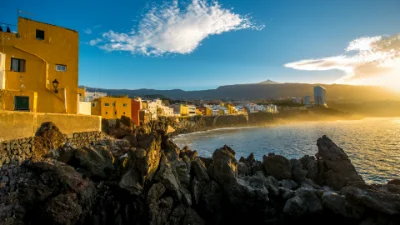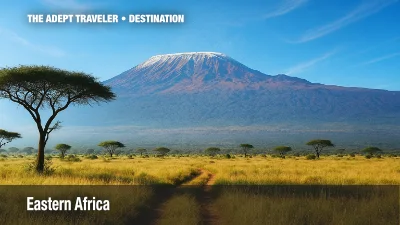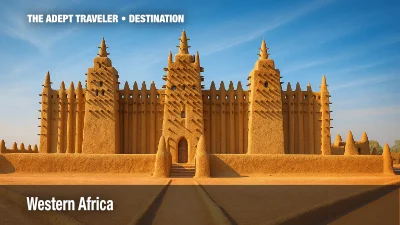Africa

Africa stretches from the Sahara dunes to Kilimanjaro's snowy crown, embracing nearly every latitude and landscape in between. The north reveals Mediterranean shores, dry desert plateaus, and maze-like souks, while the Sahel slides into rainforests humming with primates and medicinal plants. Endless savannas then roll toward fertile vineyards and surf-washed peninsulas at the continent's southern tip. These dramatic backdrops create matching climate bands, moving from arid heat to cool highlands and temperate coasts.
Centuries of trade routes, migrations, and shifting colonial borders have spun more than a thousand living languages and a mosaic of faiths that greet visitors with warm hospitality. Travelers chase big game on East and Southern African safaris, trace Nubian and Pharaonic history along the Nile, or lounge on palm-framed beaches in Zanzibar, Seychelles, and Cape Verde. Emerging rail journeys cross the Sahara, culinary tours fuse French and Swahili flavors in coastal markets, and village homestays invite guests to share daily rhythms. Modern galleries in Cape Town, Nairobi, Cairo, and Dakar sit beside centuries-old mosques, while reliable mobile networks let photographers share wild-life sightings in real time.
Seasonality at a Glance
Africa's travel calendar pivots on rainfall, wildlife movement, and holiday crowds rather than simple summer or winter labels. Peak season usually falls from June through August, when dry bushveld draws animals to waterholes and safari prices climb, and from mid-December to early January, when coastal resorts fill with school vacationers. Shoulder months, March to May and September to November, balance pleasant weather, migrating wildlife, and gentler hotel rates. Low season coincides with heavy rains across many equatorial belts; roads can flood, yet bird-watching thrives, and festivals such as Ethiopia's Timkat or Malawi's Lake of Stars unfold with thinner crowds and softer prices.
Essential Logistics
Most visitors arrive through Johannesburg, Addis Ababa, Nairobi, Cairo, Casablanca, or Cape Town, hubs that anchor broad intercontinental connections. Inside the continent, budget airlines such as Fastjet and Airlink, overnight buses, and a growing patchwork of trains link key centers. ECOWAS citizens roam visa-free across West Africa, and the East Africa Tourist Visa covers Kenya, Uganda, and Rwanda. Many other nations issue swift e-visas, while Algeria and Nigeria still require consulate appointments.
Shoestring travelers manage $40 to $80 USD a day by sharing dorms and riding buses. Mid-range travel average 120 to 250 USD, and top-tier fly-in camps exceed 400 USD nightly. International credit cards work in large cities, but carry cash for fuel stops, park gates, and remote lodges. Visit a travel clinic six weeks before departure to review yellow-fever, hepatitis, and malaria precautions, ensuring health paperwork meets border requirements.
Responsible Travel Notes
The Serengeti, Maasai Mara, and other headline reserves see vehicle clusters around river crossings and big-cat sightings, stressing wildlife and landscapes. Choosing lesser-visited parks such as Zambia's South Luangwa or Tanzania's Ruaha spreads revenue, limits crowding, and rewards guests with quieter encounters. Pack refillable water bottles, skip single-use plastics, and follow community guidelines when photographing people or sacred sites.
Advisor Insight
Complex visa rules, flight combinations, and wildlife migrations reward travelers who lean on an experienced, accredited travel advisor. Begin with this overview, continue to our region pages, and schedule a consultation to refine every detail.
Botswana

Canary Islands

Central Africa

Côte d’Ivoire

Eastern Africa

Eswantini

Fuerteventura

Gabon

Gambia

Guinea-Bissau

Gulf of Guinea

Kenya

Lesotho

Madagascar

Mauritius

Morocco

Mozambique

Namibia

Northern Africa

Republic of the Congo

São Tomé and Príncipe

Senegal

Sierra Leone

Somalia

South Africa

Southern Africa

Tanzania

Western Africa

Western Africa

Zambia

Zimbabwe

Portugal Long Haul Flights Get TAP Premium Economy

2028 World Cruise From Miami To Athens With Azamara

UAE Africa Tourism Plan To Fund $6 Billion Projects

Regional Airline Cancellations Hit African Hubs

Flight delays and airport impacts: October 8, 2025

Mozambique Lowers Advisory, but Northern Hotspots Persist

Intrepid Travel Mystery Tour Promises 14-Day African Adventure

How The Gambia Is Turning Trails and River Cruises into a Model of Sustainable Tourism

Africa Emerges as Top Destination for Adventure Tourism

Seabourn's New Luxury Land Excursions for Africa Voyage

Princess Cruises Reroutes 2025 Voyages Away from Red Sea

Seabourn's Grand Africa Voyage: A 90-Day Adventure Around the Continent

Discover the Ultimate Luxury Cruise in Africa, Vegas Hotel Transformation & Juneau Cruise Control

Regent Seven Seas Cruises Unveils New Grand Voyages for 2025 and 2026

Travel News: Disabled Travel, Safari's, and Australian Cruises

